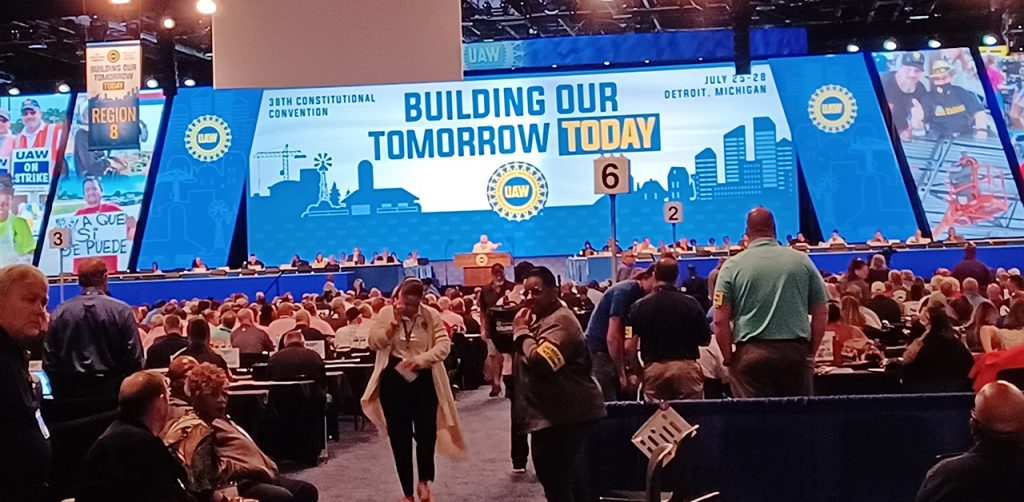Historic moments, a little controversy mark United Auto Workers convention
The event was held as the union approaches its first election where members can choose top leaders directly instead of using the delegate model.

The United Auto Workers closed its 38th Constitutional Convention last week with a bit of controversy after a week of historic moments.
The event was held as the union approaches its first election where members can choose the International Executive Board directly instead of using the delegate model it has used since its founding. An agreement between the union and the federal government required members be allowed to choose how to elect their leaders. The UAW entered into that agreement after a corruption scandal led to more than a dozen convictions. Critics say the delegate system led to that corruption.
New election rules also mean union members can put themselves forward for one of the five leadership positions.
“The intimidation has been taken away … Because it is one member, one vote, we don’t have to worry about the delegates at the convention this week stopping people from running.” —Margaret Mock, member of Local 1400
Margaret Mock announced her candidacy for secretary treasurer at the convention. She is a member of Local 140 and works in the Warren Truck Assembly paint shop. She says the new election process makes it possible for her to step forward as a pro-reform, anti-corruption candidate.
“It’s different because … people that would have never been allowed to come anywhere near that mic to run,” Mock says. “The intimidation has been taken away … Because it is one member, one vote, we don’t have to worry about the delegates at the convention this week stopping people from running.”
Several members say this convention was more democratic overall. Convention veterans say in the past members would be shouted down if they weren’t toeing the administration caucus line.
‘Movement is becoming stronger’
But at this convention, they say, more voices were heard.
This was Raymond Jensen, Jr.’s first convention. He came as an alternate delegate from local 774 in New York – the GM Powertrain plant that builds the engines for Corvettes. He is also a member of the Unite All Workers for Democracy reform caucus in the UAW.
Jensen says debate and voting on a few important issues were opened to all delegates. Those votes are generally handled by the Constitution committee.
“They did not pass,” Jensen says. “But the fact that they were pulled out of committee just adds value, and just shows that the movement is becoming stronger and stronger.”
A couple of proposals pulled out of committee passed on Wednesday. Delegates voted to increase pay for striking workers and to make strikers eligible for pay from the first day of a strike. The union heralded that vote as a sign of the UAW’s strength and commitment to its members.
Delegates reverse strike pay
Thursday as the convention ran longer than scheduled and delegates had already begun to go home, a vote was called to reverse the increase in strike pay. Delegates present did reverse it.
The issue was a major focus for reform-minded members. Some say the reversal and what they see as efforts to block discussion on the last day point to how resistant the administration caucus is to operating transparently and democratically.
Ron Lare, a Local 600 retiree and member of a reform caucus, agrees there were historic gains for rank-and-file members at this convention. But, he says, there is much more work to be done and the strike pay vote is an example of how hard the fight for reform will be.
“The administration caucus — while it was seriously challenged and received some tactical defeats at the convention — maintained control in the end,” Lare says. “And it will take a lot of democratic reform before there is the true democracy of more than one caucus with a chance to exercise power.”
The federal consent decree places a federal monitor over several union operations for three years. The monitor, Neil Barofsky, issued a report last month saying the union had failed to be cooperative and transparent with him. He pointed to a union investigation into a leader who mishandled money that he says UAW leaders try to conceal from him.
Trusted, accurate, up-to-date.
WDET strives to make our journalism accessible to everyone. As a public media institution, we maintain our journalistic integrity through independent support from readers like you. If you value WDET as your source of news, music and conversation, please make a gift today.
